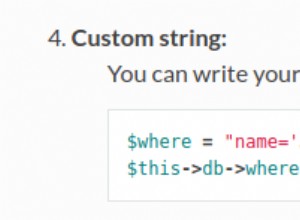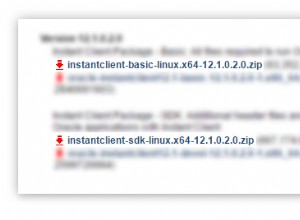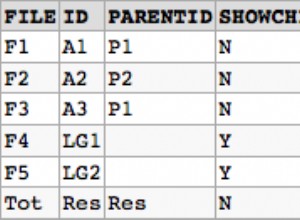Hãy đọc cái này:
https://www.evdbt.com/TGorman%20TD2005%20DWScale.doc
Những công việc này.
Bạn có gặp khó khăn trong việc truy cập khu vực tổ chức đối với truy vấn trực tuyến hoặc dữ liệu đến muộn (ví dụ:bạn có thể nhận được một hàng hôm nay cho bất kỳ ngày nào hơn hôm nay / hôm qua) không?
Tôi có mã quét qua tập dữ liệu của tôi các bản ghi mà tôi sẽ tải và đánh dấu các tiêu đề con của chỉ mục cục bộ nếu phân vùng con của bảng sẽ được sửa đổi. (Tôi đang sử dụng tài liệu này thay vì tài liệu tham khảo của Tim Gorman ở trên vì tôi có dữ liệu đến muộn và nhu cầu có khu vực tổ chức và kho hàng thích hợp có sẵn cho người dùng cuối cùng một lúc.)
Bảng của tôi là phạm vi / danh sách, không phải phạm vi / băm. vì vậy bạn sẽ phải sửa đổi nó một số, có thể bằng cách sử dụng hàm ORA_HASH để tìm (các) phân vùng con phù hợp. Tôi cũng viết ra một bảng mà các tiêu đề con mà tôi sẽ đánh dấu là không thể sử dụng được, vì vậy tôi có thể thực hiện tất cả điều đó trong một lần chuyển. Có thể hiệu quả hơn một chút nếu đánh dấu tất cả các chỉ mục của phân vùng con là không thể sử dụng được trong một câu lệnh ALTER TABLE duy nhất; Ban đầu tôi chỉ vô hiệu hóa các chỉ mục BITMAP, nhưng ngay cả khi chỉ có một chỉ mục cây B * ngoại tuyến trong quá trình tải dữ liệu đã cải thiện đáng kể hiệu quả.
procedure DISABLE_LOCAL_INDEXES as
l_part_name varchar2(30);
l_subpart_name varchar2(30);
l_sql varchar2(2000);
type partition_rec_type is record
(table_name varchar2(30),
partition_name varchar2(30),
subpartition_name varchar2(30),
list_value varchar2(10),
min_ts timestamp,
max_ts timestamp);
type partition_recs_type
is table of partition_rec_type;
l_partition_recs partition_recs_type := partition_recs_type();
l_partition_rec partition_rec_type;
l_subpart_id number := 1;
l_start_ts timestamp;
l_end_ts timestamp;
l_found_list_part boolean;
begin
-- build set of subpartitions
l_start_ts := to_timestamp ('1970-01-01', 'yyyy-mm-dd');
for i in (select p.table_name, p.partition_name, sp.subpartition_name,
p.high_value as part_high_value,
sp.high_value as subpart_high_value,
p.partition_position, sp.subpartition_position
from user_tab_subpartitions sp
inner join user_tab_partitions p
on p.table_name = sp.table_name
and p.partition_name = sp.partition_name
where p.table_name = 'MY_TARGET_TABLE'
order by p.partition_position, sp.subpartition_position)
loop
if ( (i.partition_position <> 1) and (i.subpartition_position = 1) ) then
l_start_ts := l_end_ts + to_dsinterval('0 00:00:00.000000001');
end if;
if (i.subpartition_position = 1) then
l_end_ts := high_val_to_ts (i.part_high_value);
l_end_ts := l_end_ts - to_dsinterval('0 00:00:00.000000001');
end if;
l_partition_rec.table_name := i.table_name;
l_partition_rec.partition_name := i.partition_name;
l_partition_rec.subpartition_name := i.subpartition_name;
l_partition_rec.list_value := i.subpart_high_value;
l_partition_rec.min_ts := l_start_ts;
l_partition_rec.max_ts := l_end_ts;
l_partition_recs.extend();
l_partition_recs(l_subpart_id) := l_partition_rec;
l_subpart_id := l_subpart_id + 1;
end loop;
-- for every combination of list column and date column
-- which is going to be pushed to MY_TARGET_TABLE
-- find the subpartition
-- otherwise find the partition and default subpartition
for i in (select distinct LIST_COLUMN, DATE_COLUMN as DATE_VALUE
from MY_SOURCE_TABLE
where IT_IS_BEING_MOVED_TO_TARGET IS TRUE)
loop
-- iterate over the partitions
l_found_list_part := false;
for k in l_partition_recs.first..l_partition_recs.last
loop
-- find the right partition / subpartition for list_value / date_value
if ( (i.DATE_VALUE >= l_partition_recs(k).min_ts)
and (i.DATE_VALUE <= l_partition_recs(k).max_ts) ) then
if (l_found_list_value = false) then
if (to_char(i.LIST_COLUMN, '9999') = l_partition_recs(k).LIST_COLUMN) then
l_found_list_value := true;
elsif (l_partition_recs(k).LIST_COLUMN = 'DEFAULT') then
l_partition_rec := l_partition_recs(k);
end if;
end if;
end if;
end loop; -- over l_partition_recs
-- log those partitions for later index rebuild
begin
insert into index_subpart_rebuild
(table_name, partition_name, subpartition_name)
values
(l_partition_rec.table_name, l_partition_rec.partition_name,
l_partition_rec.subpartition_name);
exception
when dup_val_on_index then null;
when others then raise;
end;
end loop; -- over MY_TARGET_TABLE.DATE_VALUE values
commit;
for i in (select ui.index_name, uis.subpartition_name
from user_indexes ui
inner join user_ind_subpartitions uis
on ui.index_name = uis.index_name
inner join index_subpart_rebuild re
on re.subpartition_name = uis.subpartition_name
where ui.table_name = 'MY_TARGET_TABLE')
loop
l_sql := 'alter index ' || i.index_name ||
' modify subpartition ' || i.subpartition_name || ' unusable';
execute immediate l_sql;
end loop;
end DISABLE_LOCAL_INDEXES;




